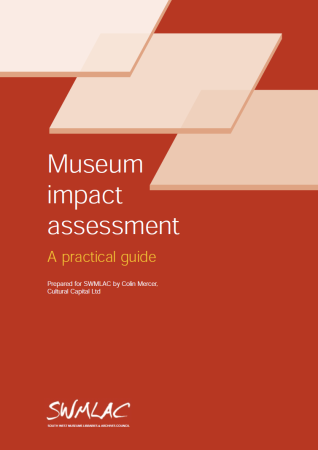ACTIONS
- Protect and safeguard cultural and natural heritage
- Learning and educational opportunities
- Cultural participation/social inclusion
- Sustainable tourism
- Support research
- Employment (recruiting, training, safety)
- Energy consumption, greenhouse gas emissions
- Waste management and reduction
- Transport (forms of, energy use)
- Commercial activities including copyright and IP
- Governance and management
- Security, disaster preparedness, risk reduction
- External partnerships and collaborations
- Toolkit/framework/roadmap
- Case studies
Museum Impact Assessment A Practical Guide

Intended Audience
Curators, Museum Development Officers and local authority community officers.
- C. Mercer, South West Museums Libraries and Archives Council (SWMLAC)
“This Guide has been produced to help curators, Museum Development Officers and local authority community officers, assess the impact of - and make a case for - the role and contribution of smaller museums. We hope that this guide will also be useful for other museums and heritage attractions, libraries and archives in compiling evidence for community plans, performance assessment and supporting grant applications.” (p.5)
Avaiable in
- English
SDGs LINKAGES
The resource is most closely related to SDG targets on management and measuring impact. These include 12.6 (adopt sustainable practices and reporting), 12.B (develop tools to measure sustainable tourism), 16.6 (effective, accountable, transparent institutions) and 17.19 (measurements for sustainable development).
Click on the SDG Target to discover Our Collections Matter indicators
-
Our Collections Matter indicators:
- Clear visions, strategies and plans in place for all aspects of sustainability – environmental, social and economic (people, planet, prosperity)- across all areas of activity.
- Visions, strategies and plans relating to sustainability to be publicly available and incorporated into planning documents.
- Commitments to be in line with local, regional, national and/or international targets and ambitions.
- Incorporation of sustainability into reporting for funders and other stakeholders, including the public. Reporting to include commitments and progress towards targets.
-
Our Collections Matter indicators:
- Quantitative and qualitative metrics identified, collected and reported for evaluating performance of tourism in terms of social, environmental and economic benefits and impacts for:
-jobs
-promotion of local culture
-local and related products
-positive social and environmental benefits
-reduction of negative impacts of tourism, e.g. climate impacts, negative social and environmental impacts.
- Quantitative and qualitative metrics identified, collected and reported for evaluating performance of tourism in terms of social, environmental and economic benefits and impacts for:
-
Our Collections Matter indicators:
- Proportion of the population [audience/users/non-users] satisfied with their last experience of public services.
- Access to information, and accountability policies and mechanisms, in place.
- Effective institutional arrangements, both for own working and for working in partnership with other sectors, in place.
- Plans and arrangements in place for extraordinary circumstances such as natural and human-caused disasters.
- Effective arrangements in place to fulfil legal and social obligations and responsibilities.
- Effective arrangements in place for transparent communication and reporting of institutional performance.
- Effective arrangements in place for transparent decision-making and accountability.
-
Our Collections Matter indicators:
- Identification and implementation of measures for sustainable development incorporating social and environmental considerations.
- Identification and implementation of both quantitative and qualitative measures of sustainable development.
